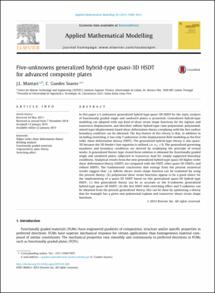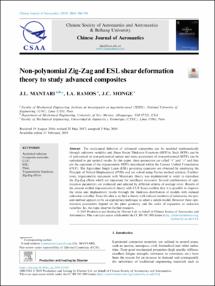Five-unknowns generalized hybrid-type quasi-3D HSDT for advanced composite plates

View/
Date
2015-09-15Author(s)
Mantari, Jose Luis
Guedes Soares, C.
Metadata
Show full item recordAbstract
Abstract
Subject
Bending deformation
Boundary conditions
Functionally graded materials
Plates structural components
Polynomials
Shear deformation
Shear flow
Shear strain
Spontaneous emission
Bending analysis
First-order shear deformation theory
Free-surface boundary conditions
Higher order shear deformation theory
Principle of virtual work
Shear deformation theory
Stretching effect
Trigonometric plate theories
Algorithms
Boundary conditions
Functionally graded materials
Plates structural components
Polynomials
Shear deformation
Shear flow
Shear strain
Spontaneous emission
Bending analysis
First-order shear deformation theory
Free-surface boundary conditions
Higher order shear deformation theory
Principle of virtual work
Shear deformation theory
Stretching effect
Trigonometric plate theories
Algorithms
Collections
Related items
Showing items related by title, author, creator and subject.
-
Non-polynomial Zig-Zag and ESL shear deformation theory to study advanced composites
Mantari, J.L; Ramos, I.A; Monge, J.C. (Elsevier, 2019-04)Acceso abiertoThe mechanical behavior of advanced composites can be modeled mathematically through unknown variables and Shear Strain Thickness Functions (SSTFs). Such SSTFs can be of polynomial or non-polynomial nature and some parameters ... -
A boundary-discontinuous-displacement based Fourier analysis of thick laminated beams via a robust 1D-CUF model
Canales, F.G.; Mantari, Jose Luis (Elsevier, 2017-04-17)Acceso abiertoThis paper presents an analytical solution for the static analysis of thick laminated rectangular beams with clamped boundary conditions at either or both of the beam's edges. A unified formulation known as Carrera's Unified ... -
A refined FSDT for the static analysis of functionally graded sandwich plates
Mantari, J.L.; Granados, E.V. (Elsevier, 2015-05)Acceso abiertoThis paper presents a static analysis of functionally graded plates (FGPs) by using a new first shear deformation theory (FSDT). This theory contains only four unknowns, with is even less than the classical FSDT. In this ...




